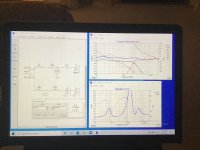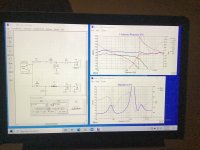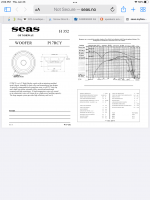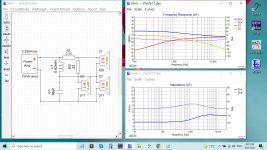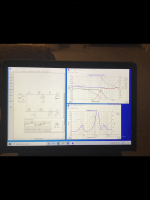People use words like "increased dynamics and detail" and "It sounds cleaner, smoother, lower distorted, better focussed"
Superlatives like this tend to lead to confusion, sending people on the wrong path.
Can I ask you, do you want your speakers to sound natural, or are you looking for something special?
Superlatives like this tend to lead to confusion, sending people on the wrong path.
Can I ask you, do you want your speakers to sound natural, or are you looking for something special?
Yeah I don’t know how a steeper crossover sounds compared to a shallow one
i guess I’ll just try and hear for myself.
i guess I’ll just try and hear for myself.
You can try a Series XO for the fun, but IMHO only 1st order Series XO is worth the effort and pays handsomely soundwise at least in my book.Thanks so much Galu
yes of course a humble amature speaker builder. Ha
is there any arrangement I can make so it’s better?
thanks again man
I personally do not like 2nd and 3rd order filters and considering the quality of your drivers they will handle 1st order series without too much blinking.
With the right drivers Series XO is unbeatable I think.
I also do not like padding resistors before the filter (the tweeter section), too much power waisted into heat. I'd rather use a single series resistor after the filter and before the driver or a combination of series/parallel resistors (kind of an Lpad but with fixed values) in the same position.
Also no Zobels, series XO doesn't need them.
My approach is SIM it in Basta and XSIM, then build an external version and play with it - run sweeps with REW, or HolmImpulse, or even simpler run sweeps through Spectroid, an Android app. And listen, listen a lot to a variety of music you are very familiar with.
Simple networks always, always sound better when the right ingredients are present.
i know this kinda sounds weird butPeople use words like "increased dynamics and detail" and "It sounds cleaner, smoother, lower distorted, better focussed"
Superlatives like this tend to lead to confusion, sending people on the wrong path.
Can I ask you, do you want your speakers to sound natural, or are you looking for something special?
I’ll know it when I hear it
again. I do love the way they sound now.
if I had a bit more immediacy it would be nice.
little more snap so to speak.
i will get new speakers at some point
but I do love the learning now with these.
i do want a natural sound.
my speakers are a touch romantic. When I say a touch , I mean that.
whereas let’s say the newer B&W 804 S4 are much faster , however they lack coherence. When I heard those, it seemed like the treble , mids, and bass were coming from separate speakers. When I say separate speakers , mind you it wasn’t that bad. Just different than my speakers. My speakers have a lush bit midrange. I’m sure the MTM helps with that.
dont know if that made any sense at all
You can try a Series XO for the fun, but IMHO only 1st order Series XO is worth the effort and pays handsomely soundwise at least in my book.
I personally do not like 2nd and 3rd order filters and considering the quality of your drivers they will handle 1st order series without too much blinking.
With the right drivers Series XO is unbeatable I think.
I also do not like padding resistors before the filter (the tweeter section), too much power waisted into heat. I'd rather use a single series resistor after the filter and before the driver or a combination of series/parallel resistors (kind of an Lpad but with fixed values) in the same position.
Also no Zobels, series XO doesn't need them.
My approach is SIM it in Basta and XSIM, then build an external version and play with it - run sweeps with REW, or HolmImpulse, or even simpler run sweeps through Spectroid, an Android app. And listen, listen a lot to a variety of music you are very familiar with.
Simple networks always, always sound better when the right ingredients are present.
thanks Stan.
hope that is your name.
yeah , I think these are all good experiments and learning what 1st 2nd etc Filters behave and sound like.
yes my drivers are very very smooth and have hardly any resonances. They roll off very smoothly.
i still want to try adding a second inductor in series to see how it sounds and behaves.
thank you so much for your input , super appreciate it
oh geez forgot you weren’t part of the pm conversation I had with Allen
here is what I was thinking of trying.
adding a second inductor ( 0.1uf) in series in the woofer circuit.
one pic shows it will the added inductor and the other shows it without ( stock).
of course this is a simulation. But I see that the second inductor makes a steeper rolloff and a ‘ tighter, cross.
I want to see how that sound.
super cheap to try.
Attachments
If you do them right then they will sound natural. Let's look at that for a moment. Natural means like two people talking, like going to a highway and listening to traffic, like going to see a band, like using kitchen appliances, like listening to your cat preen herself. Let me ask you, is nature immediate? Does it have snap? Is it dynamic?
Perhaps I'm not making myself clear. If you do it right there will be no difference.Yeah I don’t know how a steeper crossover sounds compared to a shallow one
i guess I’ll just try and hear for myself.
Yes actually I know exactly what I want.
not saying this in a snarky way. but as a musician I know very very much what I want.
in nature some things have snap. others don’t.
but let’s say for a moment that we had a neutral nature sound.
ok?
so everything we heard had a natural transient response.
now slow that response down a bit.
maybe a squirrel which has a fast chirp wound sound less annoying.
maybe a garbage can being kicked would sound less annoying.
maybe an oboe would sound a touch thicker and more lush.
now let’s assume that we make the response faster. Kind of like what I heard in the B&W 800 series speakers.
drums were more immediate.
and that was exciting.
however if you have ever listen to Joe Morello on Take Five his crash symbol is iconic.
they even have it framed from that song.
on the B&W it was killing me after awhile
on my speakers it’s a touch too soft.
see what I am getting at?
yes I definitely know exactly what I want
if I had the knowledge of speaker building I would know how to get it as well
I just don’t. So I am experiments , again as I said because it’s fun and a learning experience. And the second output of this is I might be able to ‘ improve’ upon my speakers and make them sound a bit closer to what I want.
i did the exact same thing when modding guitar amps.
learned what everything did sonically. Then was able to tailor the sound closer to what I liked most .
one amp had a very low power transformer. So it was only 395v B+. I did make some mods to it on the preamp section to get it a bit tighter. As well as on the NFB circuit.
did it make things exactly as I wanted them?
no
because the power transformer had a very low Plate voltage.
same with my speakers.
if I learn how things work sonically I will try and make them sound a bit closer to what I want. I know that wont be exactly possible because of the drivers used and possibly the cabinet construction.
hope all that made sense.
yes I totally know what I want
not saying this in a snarky way. but as a musician I know very very much what I want.
in nature some things have snap. others don’t.
but let’s say for a moment that we had a neutral nature sound.
ok?
so everything we heard had a natural transient response.
now slow that response down a bit.
maybe a squirrel which has a fast chirp wound sound less annoying.
maybe a garbage can being kicked would sound less annoying.
maybe an oboe would sound a touch thicker and more lush.
now let’s assume that we make the response faster. Kind of like what I heard in the B&W 800 series speakers.
drums were more immediate.
and that was exciting.
however if you have ever listen to Joe Morello on Take Five his crash symbol is iconic.
they even have it framed from that song.
on the B&W it was killing me after awhile
on my speakers it’s a touch too soft.
see what I am getting at?
yes I definitely know exactly what I want
if I had the knowledge of speaker building I would know how to get it as well
I just don’t. So I am experiments , again as I said because it’s fun and a learning experience. And the second output of this is I might be able to ‘ improve’ upon my speakers and make them sound a bit closer to what I want.
i did the exact same thing when modding guitar amps.
learned what everything did sonically. Then was able to tailor the sound closer to what I liked most .
one amp had a very low power transformer. So it was only 395v B+. I did make some mods to it on the preamp section to get it a bit tighter. As well as on the NFB circuit.
did it make things exactly as I wanted them?
no
because the power transformer had a very low Plate voltage.
same with my speakers.
if I learn how things work sonically I will try and make them sound a bit closer to what I want. I know that wont be exactly possible because of the drivers used and possibly the cabinet construction.
hope all that made sense.
yes I totally know what I want
Perhaps I'm not making myself clear. If you do it right there will be no difference.
ah ok.
well that is a different reply.
i didn’t know that
I was assuming that when making a low pass filter that has a slow roll off that you can still hear the woofer at higher freq but they are lower in db.
but with a steeper roll off those higher freq will be even lower and less audible
I don’t know what those woofer freq at lower db do to the overall sound.
do they make it a bit thicker? but less clarity?
when there is a steep rolloff and you can hear even less of the higher freq the woofer is still producing , does it get a touch thinner but clearer?
or as you said, does it make zero difference and people only use steep filters when drivers have resonances , so they don’t let them bleed into the signal?
do they make it a bit thicker? but less clarity?
when there is a steep rolloff and you can hear even less of the higher freq the woofer is still producing , does it get a touch thinner but clearer?
or as you said, does it make zero difference and people only use steep filters when drivers have resonances , so they don’t let them bleed into the signal?
there has to be a reason why some people like and use a 6db roll off and other like a 12dbroll off.
regardless of the drivers.
or is it not that way?
regardless of the drivers.
or is it not that way?
You shouldn't be hearing woofers or tweeters, just music.
However, woofers breakup at high frequencies. Can you hear that, yes. Can you normally hear the slope, no. Does the slope affect the breakup. yes. Can you hear when a higher slope is used, yes you can because of the breakup.
You can see the potential problem with non-specific descriptions, and it is critical if you're trying to find an issue and deal with it.
However, woofers breakup at high frequencies. Can you hear that, yes. Can you normally hear the slope, no. Does the slope affect the breakup. yes. Can you hear when a higher slope is used, yes you can because of the breakup.
You can see the potential problem with non-specific descriptions, and it is critical if you're trying to find an issue and deal with it.
Ok so what I hear you saying is that a higher slope is only used because when drivers have breakup peaks?
Well, here you are comparing 3rd and 2nd order parallel filters, not what I was talking about.thanks Stan.
hope that is your name.
yeah , I think these are all good experiments and learning what 1st 2nd etc Filters behave and sound like.
yes my drivers are very very smooth and have hardly any resonances. They roll off very smoothly.
i still want to try adding a second inductor in series to see how it sounds and behaves.
thank you so much for your input , super appreciate it
oh geez forgot you weren’t part of the pm conversation I had with Allen
here is what I was thinking of trying.
adding a second inductor ( 0.1uf) in series in the woofer circuit.
one pic shows it will the added inductor and the other shows it without ( stock).
of course this is a simulation. But I see that the second inductor makes a steeper rolloff and a ‘ tighter, cross.
I want to see how that sound.
super cheap to try.
This is what a 1st order series xo looks like, it's a different project with different drivers but the idea is the same.
Actually I think if you try your speakers with the same xo values as per that file the result will be quite good. Then you can optimise.
Of course if you want to try high order filters go ahead and do it. I've been there and done that, long, long time ago.
Attachments
No, breakup is not the only reason, that was just an example.. and peaks do not necessarily mean you need a steep slope.
There are many reasons, some good and some not.there has to be a reason why some people like and use a 6db roll off and other like a 24db roll off.
Well, here you are comparing 3rd and 2nd order parallel filters, not what I was talking about.
This is what a 1st order series xo looks like, it's a different project with different drivers but the idea is the same.
Actually I think if you try your speakers with the same xo values as per that file the result will be quite good. Then you can optimise.
Of course if you want to try high order filters go ahead and do it. I've been there and done that, long, long time ago.
you mean if I add the second inductor in series in the woofer circuit as in the pic I attached With the component values?
this one?
Attachments
No, breakup is not the only reason, that was just an example.. and peaks do not necessarily mean you need a steep slope.
There are many reasons, some good and some not.
thanks Allen!
why do some choose steeper slopes then?
or shallower ones.
not at allyou mean if I add the second inductor in series in the woofer circuit as in the pic I attached With the component values?
this one?
look carefully at the files, completely different topology although electrically they behave in a similar way
I know the names are a bit confusing - in 1st order series xo all reactive components are in parallel to the drivers, the drivers are in series
in parallel filters the reactive componets (caps and coils) are in series with the drivers
but, but...1st order series is the only network that sums flat all the time no matter the values of the components, only the XO point and the slopes vary (Q, or Zeta of the filter), in other words it is self-adjusting
it is a long topic and most people shy away from series xo for various reasons
my suggestion was to try series xo and if you like it read more about it
if not just ignore it and continue with your parallel 2nd / 3rd order experiments
- Home
- Loudspeakers
- Multi-Way
- 'Upgrading’ my tweeters (can I do this?)
